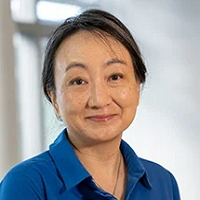Jennifer Wang, MD, FIDSA
By Merin C. MacDonald | Date published: March 15, 2023
March Researcher Spotlight: Jennifer Wang, MD, FIDSA
In this month’s Researcher Spotlight, we highlight the work of Jennifer Wang, MD, FIDSA, professor of medicine and physician in the Division of Infectious Diseases and Immunology (clinical) and faculty in the Diabetes Center of Excellence and Program in Innate Immunity (research).
Dr. Wang’s work as an infectious diseases clinician and research scientist focuses on defining the role of innate immune responses in various disease processes, including infection and autoimmunity. In her lab, she studies how the activation of host inflammatory cytokines and type I interferon impact the development of type 1 diabetes using various models including human stem-cell beta cells, and diverse animal systems. She also investigates innate immune responses to viruses including influenza, SARS-CoV-2, and coxsackie B in CRISPR-modified cell lines and in vivo. She has published nearly 80 peer-reviewed papers, including in high-impact journals such as The New England Journal of Medicine, Nature Communications, and Cell, and is a frequently invited speaker at local, national, and international meetings on autoimmune diabetes and various respiratory viruses.
Dr. Wang’s work is currently funded by the National Institutes of Health (NIH), Department of Defense (DoD), Defense Advanced Research Projects Agency (DARPA), and Juvenile Diabetes Research Foundation (JDRF). She is the principal investigator on an NIH/NIAID R01-funded project on type 1 interferon and inflammatory pathways in autoimmune diabetes, and an investigator on the New England JDRF Center of Excellence, with the long-term therapeutic goal of curing type 1 diabetes by transplanting genetically modified stem cell-derived islets to evade immune elimination. For her work on innate immune responses to viruses, she is a co-principal investigator on a DoD-funded project that uses a multidisciplinary approach to determine host response to COVID-19 in patient samples and the factors involved in pathogenesis that can be used in preventive and therapeutic measures. She is also a co-principal investigator on a DARPA-funded project, which explores novel programmable genetic elements as a means of preventing and treating influenza. Additionally, Dr. Wang is the lead site investigator for numerous clinical trials in infectious diseases, including a Pfizer Phase 3 clinical trial at UMass Chan where she and her team are studying the efficacy of a nucleoside-modified messenger ribonucleic acid (modRNA) vaccine for influenza. Additional studies include those for COVID vaccines and therapeutics and for respiratory syncytial virus vaccine. She is actively engaged in peer review of grant proposals in NIH study sections.
Beyond her clinical and research activities, Dr. Wang is dedicated to the education of the next generation of clinicians and scientists, having mentored over 20 undergraduate and graduate students, postdoctoral trainees, residents, fellows, and junior faculty. She currently gives lectures as part of the Core Lecture Series to infectious disease fellows, internal medicine residents, and medical students on various active topics in infectious diseases. Of her work with trainees, Dr. Wang commented, “I enjoy working with students, residents, and fellows on the adult infectious disease inpatient consult service at UMass Memorial Health Center, where I see how discoveries from laboratory and clinical research directly impact patient care and clinical practices.”
Dr. Wang earned her medical degree from the University of Michigan in Ann Arbor, Michigan. She completed her residency in Internal Medicine at Oregon Health and Science University in Portland, Oregon, and her fellowship in Infectious Diseases at the University of California, San Diego, California. After completing her fellowship, Dr. Wang joined the faculty at UMass Chan in 2003 with an NIH K08 career development award.

